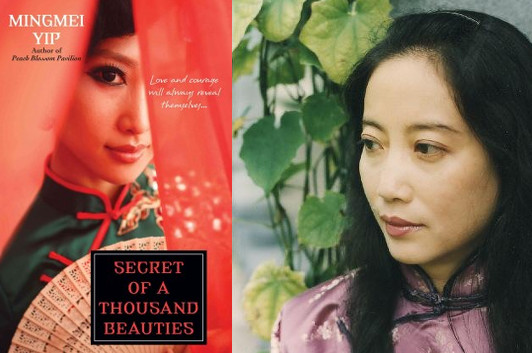Mingmei Yip: Threads of the Past

photo: MingmeiYip.com
Mingmei Yip has been a guest reader at Lady Jane’s Salon, the monthly romance reading series I help curate, on several occasions, and she joined us at the start of 2015 to share an opening scene from her most recent novel, Secret of a Thousand Beauties. She tells us a little bit about the historical origins of this book’s story here, but also stretches back into her own past to reveal how she set out on the writing path… a journey that takes a bravery and self-determination similar to that of the women she’s written about.
In traditional China, women were and sometimes still are considered men’s possessions and didn’t have much independence or freedom. A Chinese saying goes: “The worst thing that can happen to a woman is to marry the wrong man. The worst thing that can happen to a man is to enter the wrong profession.†Unfortunately, because marriages were usually arranged, many women ended up marrying the wrong man at the cost of any chance for happiness. Wary of a bad marriage, some decided to remain single for the rest of their life. These women would join small communities established for non-marrying women. They displayed this choice by tying up the hair in a long pigtail.
Most worked as maids, but some were more fortunate and could learn a traditional woman’s craft. One of these was embroidery, an art that has always appealed to me. Intrigued by these women and their sisterhoods, I decided to write about this small group of embroiderers—they are supposedly celibate, but of course many succumbed to desire.
Ghost marriage was another way women were oppressed in traditional China. Couples were often betrothed in childhood, or even before birth. Since only half of children survived to adulthood, many young women lost their fiancés. Because they had already pledged marriage, the cruel custom was to marry the woman to the dead man. As a practical matter, this meant she was a slave to her supposed in-laws.
Secret of a Thousand Beauties tells the story of a ghost-bride who escapes to learn embroidery with a former imperial embroiderer and her group of supposedly celibate woman followers. Soon, stifled by the rigid routines of the group, she helps herself to one of her teacher’s treasures—an imperial robe. Chased by agents of a secret society, she falls in love with a revolutionary and makes her way to Beijing. There she finds work in an embroidery shop, only to be tricked into marrying the boss’ son. Escaping again, she lives an even more dangerous life…
In all of my novels, my protagonists are brave and strong women who relentlessly overcome hardship and tragedy to live life on their own terms and achieve happiness. It is hard now even to try to imagine the miseries women had to endure in traditional China such as marriage to a dead fiancé, making them the slaves of the dead man’s parents, or being forced into prostitution, yet not being allowed to marry or keep their babies.
I feel honored to be able to give these once-silenced women their voices; by writing about them, they have become my teachers of determination, courage, and compassion.
When I was eight years old, my mother took me to see a Chinese opera performance. On our way, I saw the crescent moon and blurted out: “Ma, look, the moon is like my clipped fingernail!†Amazed, Mother shot back: “Wah! Mingmei, you’ll be a writer someday!â€
Perhaps it was that which planted the seed in my young mind to become a writer. From when I was eight, I always liked unusual images. When I was a teenager, I began to write poetry in which I could place my odd images, such as “A chandelier hanging low like a pregnant womb;†“annoying like burned rice sticking at the cooker’s bottom;†“eyes rolling like crawling bugs.†My poetry writing has helped my novel writing, by teaching me to pay attention to every single word.
Writing is like embroidering, because we have to choose the right word just as the embroiderer has to apply the right stitch with the right shade of color. When we weave together words to create a sentence, it is like the layering of threads to create a picture.
Now I have authored more than seven hundred thousand words—seven novels and two children’s books—yet this all was inspired by my mother’s comment about my childish remark on the moon. This makes me think of the sage Laozi’s word: “The journey of a thousand miles began on the ground under your feet…”
19 January 2015 | guest authors |

 Our Endless and Proper Work is my new book with Belt Publishing about starting (and sticking to) a productive writing practice.
Our Endless and Proper Work is my new book with Belt Publishing about starting (and sticking to) a productive writing practice. 
